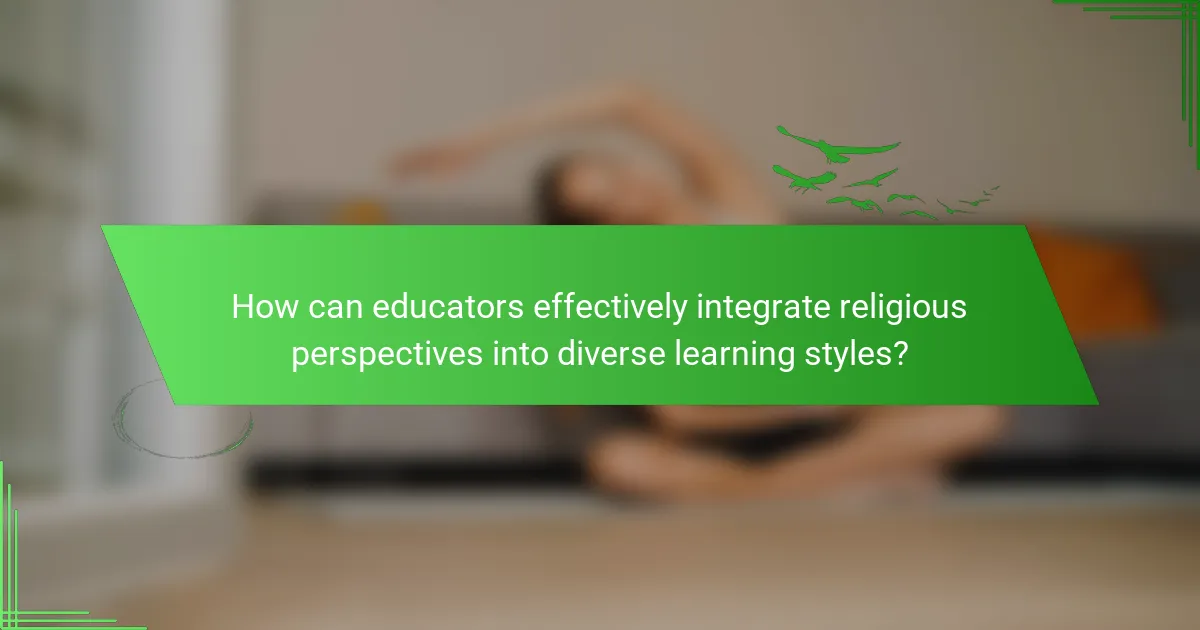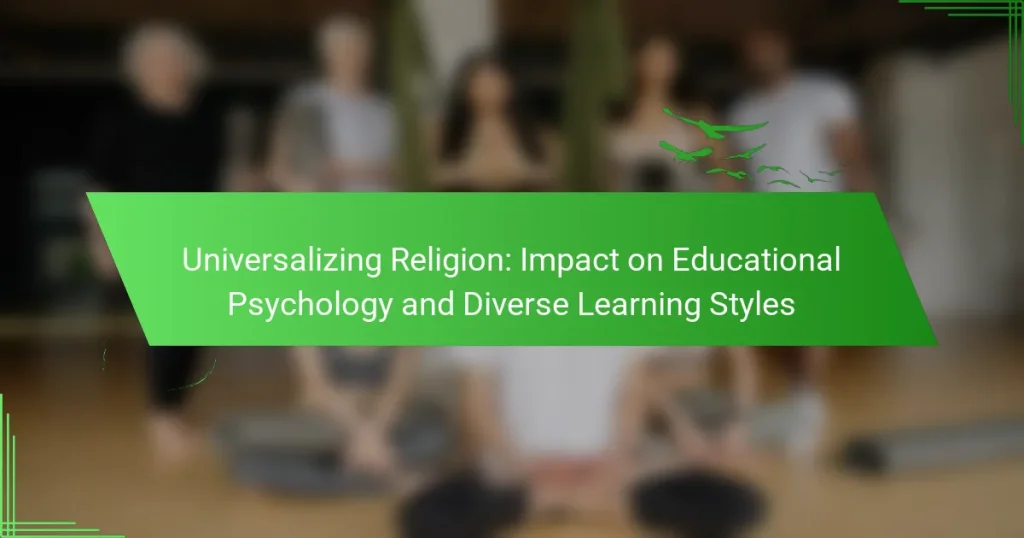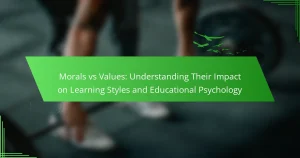Universalizing religions play a crucial role in shaping educational psychology by promoting inclusivity and enhancing diverse learning styles. They encourage collaborative learning and respect for cultural differences, which can lead to improved academic performance. Additionally, these religions foster community engagement and moral development, creating a holistic educational experience. Understanding the unique attributes of learners allows educators to effectively integrate religious perspectives into teaching methods.

How does universalizing religion influence educational psychology?
Universalizing religions significantly influence educational psychology by promoting inclusive learning environments. These religions often emphasize values such as compassion, community, and respect, which can shape teaching methods and student interactions.
The impact on diverse learning styles is notable. For instance, universalizing religions encourage collaborative learning, which aligns with social constructivist theories in psychology. This approach fosters engagement among students from various backgrounds, enhancing their educational experience.
Moreover, the principles of universalizing religions can lead to the development of curricula that respect cultural differences. This respect helps in addressing unique attributes of learners, such as their varied motivations and cognitive styles.
As a result, educational institutions that integrate these religious principles may see improved academic performance and emotional well-being among students, creating a more harmonious learning atmosphere.
What are the key principles of universalizing religions?
Universalizing religions promote inclusivity and adaptability, impacting educational psychology by accommodating diverse learning styles. They emphasize core principles such as empathy, community engagement, and moral development. These principles foster environments where varied educational approaches can thrive, enhancing individual learning experiences. Additionally, universalizing religions often encourage critical thinking and reflection, valuable in educational settings. This adaptability supports unique attributes of learners, ensuring that educational practices align with diverse cognitive needs.
In what ways do these principles shape learning environments?
Universalizing religions shape learning environments by promoting inclusivity and diverse pedagogical approaches. These principles encourage respect for various cultural backgrounds, enhancing engagement among students. By recognizing unique learning styles, educators can adapt their methods, fostering a more effective educational experience. This adaptability is crucial in accommodating diverse cognitive and emotional needs, ultimately leading to improved academic outcomes.
What role does inclusivity play in educational settings?
Inclusivity fosters a supportive environment in educational settings, enhancing learning for diverse students. It promotes engagement, allowing varied perspectives to enrich discussions. Inclusive practices, such as differentiated instruction, align with diverse learning styles, accommodating individual needs. Research shows that inclusive classrooms improve academic outcomes and social skills, reinforcing the importance of inclusivity in education.
How do universalizing religions promote moral and ethical education?
Universalizing religions promote moral and ethical education by providing a framework for values that guide behavior. These religions emphasize principles such as compassion, justice, and community service, fostering a sense of responsibility among followers.
Through teachings and texts, they encourage critical thinking about moral dilemmas, enhancing educational psychology. This approach supports diverse learning styles by integrating storytelling, discussions, and community engagement, making ethical education accessible to all.
Moreover, universalizing religions often create inclusive environments that respect various perspectives, promoting dialogue and understanding. This unique attribute enhances moral reasoning and ethical decision-making skills in learners, preparing them for real-world challenges.

What are the universal attributes of learning styles influenced by religion?
Universal attributes of learning styles influenced by religion include adaptability, community engagement, moral framework, and experiential learning. These attributes shape educational approaches, encouraging diverse methods that reflect religious teachings. Adaptability allows learners to integrate spiritual beliefs with academic content. Community engagement fosters collaborative learning, drawing on shared values. A moral framework guides ethical considerations in learning, while experiential learning emphasizes practical application of religious principles. Each attribute contributes to a holistic educational experience, enhancing the understanding of diverse learning styles within a religious context.
How do cultural backgrounds impact learning preferences?
Cultural backgrounds significantly shape learning preferences by influencing values, communication styles, and approaches to knowledge. For example, collectivist cultures often emphasize group learning, while individualistic cultures may prioritize personal achievement. Research indicates that students from different cultural backgrounds may engage differently with educational materials, impacting their motivation and retention. Understanding these differences allows educators to tailor their teaching strategies to accommodate diverse learning styles effectively.
What common learning styles emerge across different religions?
Different religions often emphasize distinct learning styles that reflect their teachings. Universalizing religions, which seek to appeal to a broad audience, commonly promote experiential and communal learning approaches.
For example, Christianity often encourages group study and discussion, fostering social learning. Buddhism emphasizes mindfulness and meditation, aligning with introspective learning styles. Islam values the memorization of texts, reflecting a structured and repetitive learning approach.
These diverse styles cater to various cognitive preferences, enhancing educational psychology within religious contexts. The integration of these methods can lead to a more holistic understanding of spiritual teachings.

What unique attributes arise from the intersection of religion and learning styles?
Universalizing religions influence educational psychology by shaping diverse learning styles. Unique attributes include the emphasis on community engagement, moral development, and holistic learning approaches. These attributes foster collaborative environments that cater to various cognitive preferences, enhancing educational outcomes. Additionally, universalizing religions often promote values like respect for diversity and critical thinking, aligning with contemporary educational practices.
How do specific religious teachings affect cognitive development?
Specific religious teachings significantly influence cognitive development by shaping values, moral reasoning, and learning approaches. Universalizing religions often promote critical thinking and inclusivity, enhancing educational psychology. For instance, teachings that emphasize compassion and community can foster collaborative learning styles, encouraging diverse perspectives. This unique attribute of universalizing religions supports adaptability in educational settings, leading to improved cognitive outcomes. As a result, learners from these backgrounds may exhibit enhanced problem-solving skills and emotional intelligence.
What unique educational strategies are derived from universalizing religions?
Universalizing religions influence educational strategies by promoting inclusivity and diverse learning styles. These religions, such as Christianity, Islam, and Buddhism, emphasize values like compassion, community, and the pursuit of knowledge.
Unique educational strategies derived from these religions include interdisciplinary approaches that integrate moral teachings with academic subjects. For example, lessons may incorporate ethical discussions based on religious principles alongside critical thinking exercises.
Additionally, universalizing religions often advocate for experiential learning, encouraging students to engage in community service and cultural exchanges. This hands-on approach fosters empathy and a deeper understanding of diverse perspectives.
Finally, these religions support holistic education, addressing emotional, spiritual, and intellectual growth. This strategy aligns with the belief that education should nurture the whole person, preparing learners for both personal and communal responsibilities.
How do storytelling and parables enhance learning?
Storytelling and parables enhance learning by making complex concepts relatable and memorable. They engage diverse learning styles through narrative techniques that foster emotional connections. By universalizing religious themes, these stories create common ground for learners, facilitating deeper understanding. This approach caters to unique attributes of educational psychology, such as enhancing retention and promoting critical thinking skills.
What role does communal learning play in religious contexts?
Communal learning fosters a sense of belonging and shared purpose in religious contexts. It enhances educational psychology by promoting diverse learning styles through collective experiences. This approach encourages open dialogue, allowing individuals to express varied interpretations of religious teachings. Consequently, communal learning nurtures critical thinking and empathy among participants, essential for personal and spiritual growth.

What rare attributes can be identified in educational psychology related to universalizing religions?
Universalizing religions influence educational psychology by promoting inclusivity and diverse learning styles. Rare attributes include the emphasis on global citizenship, moral development across cultures, and adaptability of teaching methods to various religious contexts. These attributes foster a holistic approach to education that respects multiple perspectives and encourages critical thinking. Additionally, the integration of universal values can enhance social cohesion in diverse classrooms, promoting a shared sense of purpose among students.
Are there specific case studies showcasing innovative educational practices?
Yes, there are case studies that illustrate innovative educational practices influenced by universalizing religions. For instance, the integration of mindfulness practices in classrooms has roots in Buddhist teachings, enhancing emotional regulation and focus among students. Additionally, schools that incorporate diverse religious perspectives often foster inclusive environments, promoting respect and understanding among students of varying backgrounds. These practices demonstrate how educational psychology adapts to embrace diverse learning styles, ultimately enriching the learning experience.
What uncommon learning styles are observed in religiously diverse classrooms?
Uncommon learning styles in religiously diverse classrooms include experiential, communal, and narrative approaches. These styles emphasize personal experience, group collaboration, and storytelling, respectively. Experiential learning allows students to engage deeply with their beliefs, while communal learning fosters a sense of belonging. Narrative approaches help contextualize religious teachings within students’ lives, enhancing understanding. Each style reflects the unique attributes of diverse religious backgrounds, promoting inclusivity in education.

How can educators effectively integrate religious perspectives into diverse learning styles?
Educators can effectively integrate religious perspectives into diverse learning styles by recognizing the unique attributes of each learner. This approach fosters inclusivity and enhances engagement. For instance, incorporating storytelling from various religious traditions can resonate with auditory learners, while visual learners may benefit from art and symbolism associated with different faiths.
Additionally, experiential learning through community service projects can appeal to kinesthetic learners, allowing them to connect religious teachings with real-world applications. Understanding the root attributes of learning styles enables educators to tailor their methods effectively.
As a result, blending religious perspectives with diverse learning strategies not only enriches the educational experience but also promotes critical thinking and empathy among students.
What best practices should educators adopt for inclusivity?
Educators should adopt inclusive practices that recognize diverse learning styles influenced by various religious perspectives. These practices include differentiated instruction, culturally relevant pedagogy, and fostering a supportive classroom environment.
Differentiated instruction tailors teaching methods to meet individual student needs, enhancing engagement and comprehension. Culturally relevant pedagogy incorporates students’ cultural backgrounds, promoting inclusivity and respect. A supportive classroom environment encourages open dialogue and collaboration, allowing students to express their beliefs and learning preferences.
Research shows that inclusive practices improve academic outcomes and emotional well-being. For instance, students exposed to diverse perspectives demonstrate greater empathy and critical thinking skills. Thus, implementing these best practices is essential for educators to foster an inclusive learning atmosphere.
What common mistakes should be avoided when teaching in a religiously diverse environment?
To effectively teach in a religiously diverse environment, avoid oversimplifying beliefs and practices. Recognize individual differences and foster an inclusive atmosphere.
Common mistakes include failing to acknowledge the complexity of religious identities, making assumptions about students’ beliefs, and using a one-size-fits-all approach. Additionally, neglecting to provide diverse perspectives can alienate students.
Encourage open dialogue and create space for all voices. This approach enhances engagement and promotes understanding among students from various backgrounds.
How can religious teachings be leveraged to enhance student engagement?
Religious teachings can enhance student engagement by fostering a sense of community and purpose. Incorporating diverse religious perspectives in educational settings promotes inclusivity and respects various learning styles. This approach can lead to increased motivation and participation among students, as they find personal relevance in the material. Furthermore, unique attributes of religious teachings, such as moral lessons and narratives, can be utilized to create relatable content that resonates with students’ experiences. As a result, educators can leverage these teachings to cultivate a more dynamic and engaging learning environment.
What expert insights can guide educators in this integration process?
Expert insights for educators in the integration process of universalizing religion into educational psychology emphasize the importance of understanding diverse learning styles. Educators should adopt inclusive teaching strategies that acknowledge various cultural perspectives. This approach fosters a supportive environment, enhancing student engagement and learning outcomes. Additionally, implementing reflective practices allows educators to assess the impact of religious diversity on student psychology. By integrating these insights, educators can create a more holistic educational experience that respects and values all students’ backgrounds.




